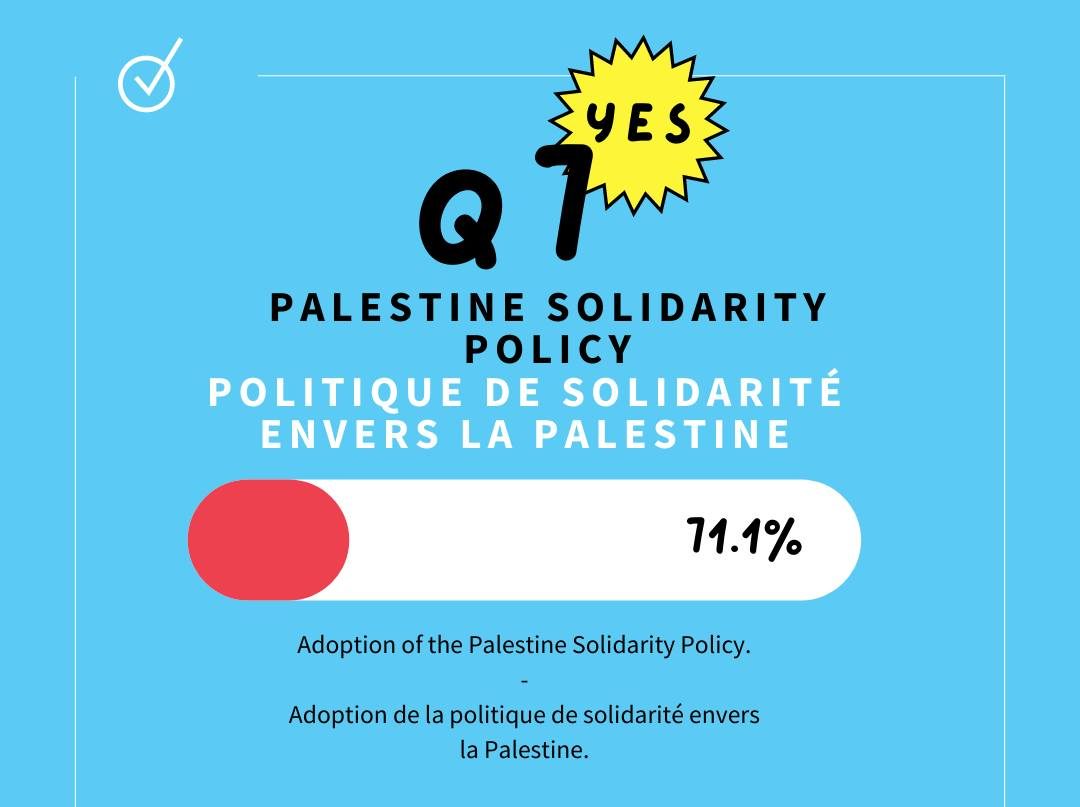The principal of McGill University told Jewish groups it will “take action” against the undergraduate students’ union over its adoption of a pro-BDS policy if the union does not act in accordance with an earlier agreement with the administration or its own rules.
B’nai Brith Canada and Friends of Simon Wiesenthal Center (FSWC) made public emails Suzanne Fortier had sent them concerning the “Palestine Solidarity Policy” that students approved in a referendum held by the Students’ Society of McGill University (SSMU) in mid-March.
Fortier stated that the policy is “inconsistent with the SSMU constitution as well as previous decisions by its internal governance bodies. We are also concerned about alleged irregularities in the referendum process.”
She said “these views have been communicated to the SSMU leadership and we advised them to take prompt and appropriate remedial action consistent with SSMU’s obligations under its Memorandum of Agreement with the university, failing which the university will take action.”
Fortier further stated, “The current initiative by SSMU will lead to polarization that fosters a culture of ostracization and disrespect on the basis of students’ identity, religious or political beliefs.”
The McGill administration, she added, will “take all necessary measures to ensure that our students continue to feel safe and free of harassment, including holding SSMU accountable to the principles and values of its own constitution.”
FSWC and B’nai Brith commended Fortier for her prompt and forthright attention to their concerns that the policy contains “blatant disinformation” about Israel and creates an intimidating climate on campus for Jewish students, as well as about the legitimacy of the referendum process.
They say an anti-Israel question should never have been considered, pointing to a 2016 opinion by the SSMU Judicial Board that adopting a platform “against specific nations” is unconstitutional and a breach of its equity policy.
At the last minute, the Judicial Board issued an interim order that the Palestinian question be removed while the SSMU board of directors reviews its legality. Elections SSMU, an arm’s-length body, overruled that, deciding the policy, if adopted, could be repealed if the board did eventually quash it.
More than 70 percent of the 3,960 ballots cast in online voting from March 15-21 were for the policy, representing a small proportion of McGill’s 26,765 undergraduates.
The policy not only demands the university boycott all corporations and institutions said to be “complicit in settler-colonial apartheid against Palestinians,” but also incriminates Israel for land theft, deportations and “extrajudicial killings.” Furthermore, it charges that pro-Palestinian students are being surveilled and “smeared.”
It also mandates the SSMU to make at least one pro-Palestinian public statement each semester, including on “Nakba Day” as Palestinians refer to the State of Israel’s 1948 independence, “authored by the SSMU Palestine Solidarity Committee” that is to be created.
Jonah Fried, the student who spearheaded the petition for an injunction against the question with the Judicial Board, shared a communication sent by Fabrice Labeau, deputy provost (Student Life and Learning), to the McGill community, which he finds encouraging.
Labeau writes, “At a time when the provost and vice-principal (academic) has just tasked associate provost (Angela) Campbell and me to develop an initiative to prevent antisemitism and Islamophobia on our campuses, I am saddened to witness the unfolding of an initiative that can only bring more division to our community.”
The policy “create(s) excessive polarization in our community, encourage(s) a culture of ostracization and disrespect due to students’ identity, religious or political beliefs, in contradiction with the university’s values of inclusion, diversity, and respect…
“Robust debate is key to what we do and who we are as a university. But such debate cannot be carried out at the expense of respect and inclusion,” Labeau wrote.
Fried is a campus fellow of CAMERA (Committee for Accuracy in Middle East Reporting and Analysis). Other pro-Israel campus groups – StandWithUs Canada, Israel on Campus McGill, Hasbara Fellowships Canada, and Hillel McGill, jointly condemned the policy.
“There is no doubt that this policy will contribute to a hostile environment for Jewish students at McGill and to a rise in antisemitism. During the campaign period for this question, many Jewish and pro-Israel students were targeted with egregious antisemitic messages,” they stated.
“SSMU has a responsibility to all of its members. It is especially concerning that SSMU has supported a policy that singles out and targets a minority community on campus.”
“We are relieved that the McGill University administration is taking this issue seriously, and we await expectantly the news that the SSMU will be cancelling its illegitimate anti-Israel policy,” stated Jaime Kirzner-Roberts, FSWC’s director of policy.
“The State of Israel has remained the only nation to be targeted with such defamatory declarations and obscenely biased campaigns by student unions and groups, ultimately creating a toxic environment for Jewish students and staff—the majority of whom support Israel.”
B’nai Brith, which asked the McGill administration to withhold fees from SSMU “to protect Jewish students,” applauded “this early and principled statement of intent” by the administration.
“No university should stand for antisemitism or votes contrary to the rule of law, and funds should not be provided to student organizations that are guilty of this conduct,” stated CEO Michael Mostyn.
Last week, the Concordia Student Union (CSU), which represents undergraduates at that university, adopted through referendum an anti-apartheid policy. It does not explicitly target Israel.
An overwhelming majority agreed that the CSU should oppose apartheid, as defined by organizations such as Human Rights Watch and Amnesty International, and divest from any state or business that practises it. Voter turnout, however, was only about five percent.
